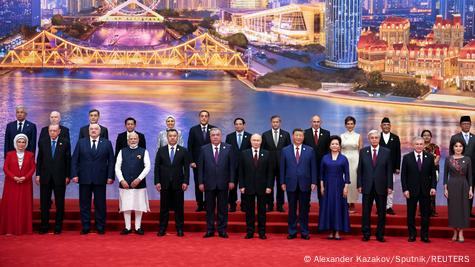By Abdiqani Abdullahi
Tianjin, China — In a world grappling with persistent geopolitical tensions and economic headwinds, the 2025 Shanghai Cooperation Organization (SCO) Summit has emerged as a powerful symbol of collaboration and a new model for international relations. Held in the vibrant port city of Tianjin, the summit transcended mere diplomacy to become a showcase of a shared vision for a more just and equitable world order. Far from a simple meeting, it was a grand display of unity and a definitive step toward forging a more connected and stable Eurasian landscape.
This year’s gathering, the largest in SCO history, was marked by an extraordinary display of diplomatic warmth. Leaders from across the Eurasian landmass, including Chinese President Xi Jinping, Russian President Vladimir Putin, and Indian Prime Minister Narendra Modi, were seen sharing handshakes, smiles, and even a convivial car ride. This camaraderie, widely noted in international media, speaks to a deepening strategic trust and a collective recognition that a multipolar world requires dialogue and partnership, not confrontation. As the world navigates an era of uncertainty, the images of these leaders together send a clear message: the future is being built on bridges, not barriers.
The positive energy of the summit was more than just optics; it was rooted in substantive agreements and forward-looking strategies. The centerpiece of the event was the adoption of the Tianjin Declaration, a robust document that provides a consolidated approach to pressing regional and international issues. This was accompanied by the approval of a 10-year development strategy for the SCO, charting a clear, actionable course for the organization from 2026 to 2035. These documents lay the groundwork for a more efficient and impactful SCO, one that can truly serve as a beacon for its member states and the broader international community.
The summit’s success is a direct result of the enduring “Shanghai Spirit.” This guiding principle, with its emphasis on mutual trust, mutual benefit, equality, and a respect for diverse civilizations, has enabled the SCO to grow from its original six founding members to a vast family of nations spanning Asia, Europe, and Africa. It’s a spirit that rejects zero-sum thinking and unilateralism, offering a refreshing and inclusive alternative to the outdated models of international engagement. In Tianjin, the “Shanghai Spirit” was not just a phrase; it was a living philosophy, guiding every conversation and shaping every agreement, ensuring that the SCO’s collective strength is used for the common good.
The true significance of the Tianjin Summit lies in its tangible outcomes across security and economic cooperation. Leaders in attendance didn’t just talk about a better future; they signed over 20 key documents to make it a reality. On the security front, the summit made major strides with the establishment of new centers to address contemporary challenges such as organized crime, drug trafficking, and cybersecurity. These initiatives provide a concrete framework for a more coordinated and effective response to threats that transcend national borders. The SCO’s Regional Anti-Terrorist Structure (RATS) will now be further strengthened by a new anti-drug center and a universal center for countering security challenges, solidifying the organization’s role as a regional security anchor.
Economically, the summit heralded a new phase of collaboration. A major highlight was the push for an SCO development bank, a financial mechanism aimed at enhancing trade and investment facilitation among member states. This is a critical step towards creating a robust, self-reliant economic bloc that can weather global volatility and promote sustainable growth. Beyond this, leaders also signed a roadmap for energy cooperation, a statement on green industry development, and a call for deeper collaboration in artificial intelligence and the digital economy. These agreements reveal a sophisticated and forward-thinking agenda that is focused on harnessing emerging technologies and clean energy to power the region’s shared prosperity.
The summit also served as a crucial stage for productive bilateral diplomacy. In a widely reported development, the Tianjin Declaration included a strong condemnation of the April 22 terrorist attack in Pahalgam, calling for the perpetrators, organizers, and sponsors to be brought to justice. This unified stance, articulated in the presence of Pakistan’s Prime Minister, was a powerful statement against double standards and showcased the SCO’s commitment to a collective fight against terrorism.
Indian Prime Minister Modi’s interactions with President Xi Jinping were particularly impactful. In their first face-to-face meeting in over seven years, the leaders agreed to work towards a fair solution to their border issues. This dialogue, which also covered enhanced trade and people-to-people exchanges, offers a hopeful sign of de-escalation and a pragmatic approach to managing differences. The positive signals from this meeting alone were enough to lift investor confidence, demonstrating the immense economic weight of these two nations working in concert.
The Tianjin Summit was, at its core, a strong and unified voice for the Global South. For many member states, it represents a crucial platform to assert their sovereignty and shape a more representative global governance system. Leaders from countries like Iran and Belarus, for example, framed the summit as a direct counter-narrative to what they perceive as Western unilateralism and economic coercion. The SCO’s focus on multilateralism and the rejection of a “Cold War” mindset offers a viable and attractive alternative to nations seeking to forge independent paths in a complex international landscape.
China’s role as the host nation and a major economic engine for the bloc was front and center. In his address, President Xi Jinping emphasized his country’s commitment to the SCO’s development by announcing significant financial and technical support. This includes a grant of 2 billion yuan to other SCO states and an additional 10 billion yuan in loans to member banks over the next three years. These commitments, along with initiatives to establish new cooperation platforms in energy and the digital economy, reflect a dedication to shared prosperity and a belief in the SCO as a vehicle for collective advancement.
The summit also made strides in cultural and people-to-people exchanges. India’s proposal for a Civilizational Dialogue Forum was welcomed as a way to further strengthen ties through shared heritage and cultural understanding. This focus on soft power, alongside hard security and economic cooperation, illustrates the comprehensive nature of the SCO’s vision.
As the world looks ahead, the outcomes of the Tianjin Summit provide a clear blueprint for a more stable and cooperative future. The SCO’s ability to unite diverse nations on a shared platform, to make concrete agreements on complex issues, and to articulate a common vision for a multipolar world is an inspiring example of effective diplomacy. The work done in Tianjin sets the course for a new era, where security, connectivity, and opportunity are pursued together for the benefit of all.





